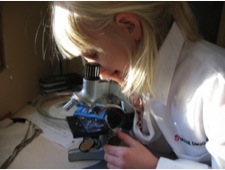Unfortunately, almost all of us take our definition of "school" from the limited experience of our own schooling. Whether or not we actually acknowledge it, the public school system becomes our model of how things should actually work. We presume learning is best broken up into defined subjects, that tests are the best measure of learning, that we should finish the math book each year, and most of all, that school is work...
 Are you beating your head against a wall? Is your thirteen year old impossible to teach? Is the curriculum that has worked so well in the past suddenly "boring?"
Are you beating your head against a wall? Is your thirteen year old impossible to teach? Is the curriculum that has worked so well in the past suddenly "boring?"
I recently spoke with a mother of many who, after completing an enjoyable unit study of reading and discussion on Holland, decided her fourteen year old son should follow-up this project with something concrete. She asked him to write an essay on the history of the development of the tulip industry - a topic they had all found to be interesting. As days of reluctance dragged into weeks of resistance, a normally affable mother-son relationship became outright antagonistic....
By this time of year you will likely have developed a pattern or routine in your home-school day to accomplish your selected program of studies. Your children engage themselves with the various subjects that you assign them, most often with the help of a text book or other written resource. Depending on your child’s age and ability, the reading in these books may be done by your child, or you may be the one to read and explain the material to your eager learner.
There exists constant pressure in our society to adapt to a way of thinking. Webster’s dictionary defines ‘adapt’ as “to modify (oneself) to conform to a circumstance or environment” or alternatively “to become adjusted to a circumstance or environment.” When studying and researching in the sciences, the student will eventually (if not immediately) encounter the evolution perspective. Whether it is biology, geology or astronomy, the processes of evolution will be applied to living and non-living objects. When something evolves, it is believed to have changed from a less complex form to a higher order of complexity. Ignoring this perspective will not make it disappear. But remember… it is only a perspective.Webster’s dictionary describes evolution as a doctrine. Yes, a doctrine!
2014 High School and Beyond Conference
"Forward Confidently"
Was held November 15, 2014
Want your own copy?
If you would like to purchase your own copy of the talks, please let our office know. For $5, we will send you the full collection of talks on your choice of USB key or on CD.
Email orders@wisdomhomeschooling.com
Are you Here to Give or Get?
Kenneth Noster
Matching career to calling is far more rewarding than making decisions based upon income, prestige, or other incentives pushed by our society. Considering your experiences, abilities, and interests, what is being asked of you? What is God designing you for?
Home School Grad Panel
Evan & Natalie Muller, Katheryn Ahlf, Blair Bishop, Nathaniel King
A panel of home schooled graduates discuss a variety of methods by which they effectively, and not so effectively, applied their high school years. Ask them questions that pertain to your own life and aspirations. The variety of approaches and outcomes demonstrate that every home school path is somewhat unique.
A Look Back at High School Through College
Brianne Adrian, B.Ed
Looking back at decisions made during home schooling and since, Brianne is able to offer solid advice to home school youth. Find out how home schooling has provided the keys to her success in study, work, and life.
Its Time to Get Serious
Paul & Mark
A father and youth argue over the benefits of self-discipline and daily purpose, compared to living in the moment and enjoying life. How do you make the most of life and the daily gifts you are being given?
A Variety of Approaches to High School at Home
Patty Marler, Kelvin & Dorothea Presakerchuk, Jeff & Lisa Bekolay
Continually reminding themselves that curriculum is much more than the resources being used, parents reflect on how they needed to adjust their approach and learning materials in order to achieve their goals and those of their children.
Be Confident, Thou Shall Prosper
Tim Hoven
A dynamic speaker, a home schooling father and owner and operator of Hoven Farms, a certified organic, multi-generational farm, Tim demonstrates how it is not only socially responsible to plan for success in our lives, but how the Bible strongly affirms the value of this striving. Tim’s presentation will stimulate discussion on the merits of good business sense, the joy of serving others, and the importance of friendship in our lives.
Transcript of talk by tutor Ben van den Bosch given at WISDOM’s Great Books event, January 30th, 2016.
My parents began homeschooling me in grade 1, but I'm sure they never thought at the time that they would continue to do so right up until high school. We took a rather eclectic approach, which means that we drew resources from various places and put together our own curriculum to meet our (my) needs. It worked very well for us, but as I neared high school, my parents began to feel a certain amount of apprehension. Were they doing the right thing? Personally, I was very excited about homeschooling through high school, and told my parents that this was what I wanted to do. We discussed together what I wanted to study before I graduated, and although my parents had their own requirements I had to fulfill, I was able to direct my own education to certain extent. Because what we'd been doing so far had been working for us, it only made sense to continue in that way.
“Science, science, science…” Those were the words of advice expressed to me, by a home-school mom, in answer to a question about what to focus on in the primary years of home schooling.
When we think of science, what usually comes to mind are subjects in the areas of biology, chemistry, or physics. What does the word ‘science’ mean? The word ‘science’ comes from the Latin word scientia, which means knowledge – to know. Science could be summed up as that process by which we seek to know and understand the deeply intricate things of all that we see (and can’t see) around us.
Find out more about how WISDOM can be part of your home school journey.
Notes to Myself is a much loved column by Marlane Noster. Her warm and flowing style is like looking over a shoulder into a journal, and her wit and wisdom is appreciated by all. Write to her at marlane@wisdomhomeschooling.com.



